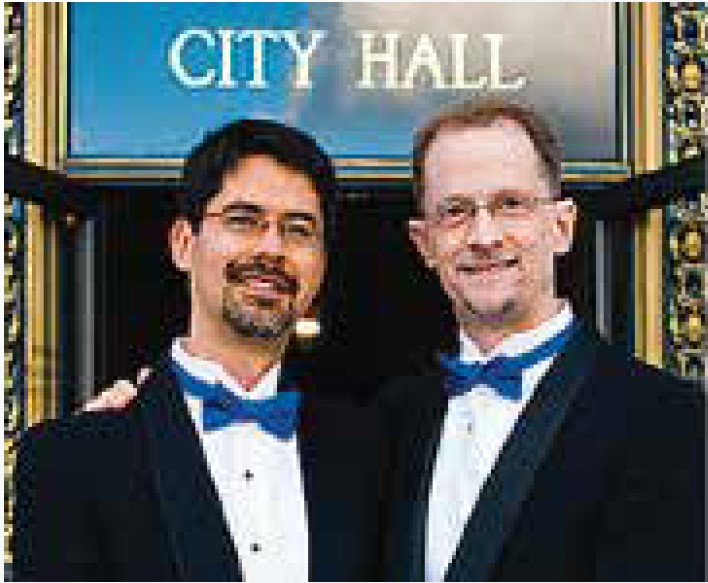
By John Lewis and Stuart Gaffney–
On July 8, the Central European nation of Slovenia made history when it became the first former Soviet-bloc country and the 32nd country in the world with marriage equality. In a sweeping 6–3 ruling, the Slovenian Constitutional Court ruled in favor of equality and also invalidated laws prohibiting same-sex couples from adopting children. The decision took effect immediately with the Court giving the legislature six months to conform federal law to its decision. The groundbreaking decision could build momentum for marriage equality elsewhere such as the Czech Republic, another former Soviet-bloc country, and neighboring Italy.
Two weeks later, the tiny European nation of Andorra, perched in the Pyrenees between France and Spain, became the 33rd nation with marriage equality when its parliament unanimously enacted equality legislation as well as provisions enabling transgender people to update their names and genders on legal documents.

We ask: Will the U.S. be able to keep up? The federal Respect for Marriage Act that would legislatively affirm marriage equality protections for LGBTIQ couples was introduced in Congress nine years ago, but it has still not passed. There’s new urgency to pass the law now.
As background, the U.S. Supreme Court in the 2013 Windsor decision struck down the notoriously mis-named 1996 Defense of Marriage Act (DOMA) that prohibited federal recognition of same-sex marriages. In 2015, the Court established nationwide marriage equality as a fundamental constitutional right in the landmark Obergefell ruling.
But DOMA remains on the books today despite its being rendered unenforceable nine years ago by Windsor. And the composition of the U.S. Supreme Court has changed dramatically since the Windsor and Obergefell decisions. In his concurring opinion to this June’s anti-abortion Dobbs decision, Justice Thomas proclaimed his belief that the Court should reconsider Obergefell as well as decisions protecting the right to contraception and LGBTIQ people’s right to sexual intimacy, declaring all decisions based on substantive due process to be “demonstratively erroneous.”
Although no other Justice joined Thomas’ concurrence, it alarmed the LGBTIQ community and all those who value fundamental human rights and freedoms. The majority decision in Dobbs assured multiple times that its anti-abortion decision “unequivocally” would not “imperil” marriage and other rights and that such fears were “unfounded,” but the Court’s three dissenting Justices along with many Court observers remain skeptical. Although decisions protecting these rights do not appear to be at immediate risk, the LGBTIQ community is left feeling vulnerable to future attack.
In response, LGBTIQ rights supporters in Congress renewed efforts to pass the Respect for Marriage Act. The legislation would wipe DOMA off the books, meaning that married LGBTIQ couples would no longer have to rely solely on the Supreme Court’s Windsor decision to ensure federal recognition of their marriages.
However, it is important to understand that there is widespread consensus that Congress lacks the power through a federal statute to require states to permit LGBTIQ couples to marry. Obergefell held that the highest law of the land, the U.S. Constitution, prohibits states from denying same-sex couples the right to marry. But if the Supreme Court someday took the egregious step of overruling Obergefell, either a federal Constitutional amendment would be needed to re-establish marriage equality as a constitutional right, or a future Court in a future case would have to reverse the overruling of Obergefell.
The Respect for Marriage Act would do everything in Congress’ power to protect the marriage rights of LGBTIQ people if the Court stooped so low as to overrule Obergefell. The Act declares that the federal government recognizes all marriages between LGBTIQ couples that are legal in the state where they are performed, regardless of whether the couples’ home states recognize their marriages.
It also mandates that any state that does not permit LGBTIQ couples to marry must still recognize marriages of its residents who go to other states to marry. Unfortunately, if this provision were someday needed, it would require some couples to travel out-of-state to marry, and would likely face a legal challenge, which we hope would ultimately prove unsuccessful. But all of this dizzying legal analysis underscores not only the critical importance of both constitutional and statutory rights but also the truth of the dictum: Equality is simple; discrimination is complicated.
The Respect for Marriage Act breezed through the House of Representatives on a 267 to 157 vote, with 47 Republican members voting in favor. Now all eyes turn to the Senate, where openly LGBTIQ Senator Tammy Baldwin of Wisconsin is spearheading efforts to gain the 60 votes needed for passage. All 50 Democrat Senators and some Republicans have signaled their support, and LGBTIQ grassroots activists are pressing additional Republican Senators for their votes. President Biden, who as a Senator voted in favor of DOMA along with 84 of his Senate colleagues back in 1996, stands ready to sign the bill. However, the ultimate outcome remains uncertain.
When the Slovenian Constitutional Court last month ordered the nation’s Parliament to enact marriage equality legislation, Labor, Family, and Social Affairs Minister Luka Mesec exclaimed, “We will do it with the greatest pleasure in the shortest possible time.”
It’s been over a quarter century since DOMA passed. The profound change that has taken place over the last 26 years is inspiring, but the LGBTIQ community has gone far beyond merely being impressed that more people are supporting us now than ever before. It’s time for concrete action and passage of the Respect for Marriage Act now.
John Lewis and Stuart Gaffney, together for over three decades, were plaintiffs in the California case for equal marriage rights decided by the California Supreme Court in 2008. Their leadership in the grassroots organization Marriage Equality USA contributed in 2015 to making same-sex marriage legal nationwide.
Published on August 11, 2022
Recent Comments